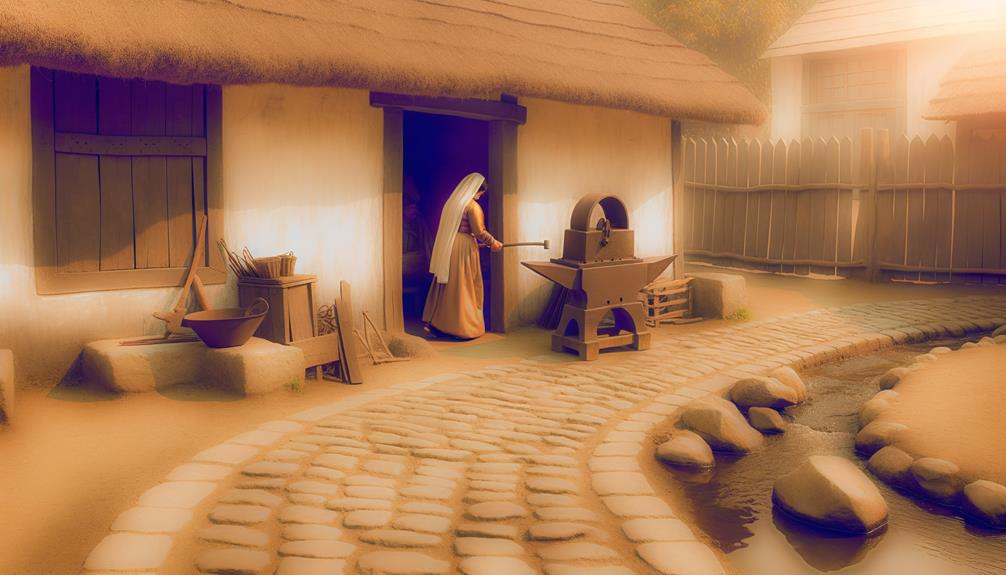Meaning of the Name Clark
The name Clark finds its etymology in Old English 'clerc', derived from the Latin 'clericus', meaning a literate individual in clerical or scholarly roles. Originating from medieval England, it was associated with administrative and religious functions.
Over time, it transformed from an occupational title to a hereditary surname, symbolizing the legacy of learning and dedication. Notable individuals like William Clark of the Lewis and Clark Expedition and the writer Arthur C.
Clarke highlight its rich cultural significance. Today, its phonetic simplicity and historical depth guarantee its enduring popularity.
To explore the evolution and cultural impact of this name further, there is much more to discover.

Key Takeaways
- The name Clark originates from the Old English word 'clerc,' meaning scholar or cleric.
- It derives from the Latin term 'clericus,' associated with literate individuals.
- Historically, it was used for people in clerical and administrative roles in medieval England.
- The surname evolved from an occupational title to a hereditary surname.
- Clark is a popular name today, respected across various fields and cultures.
Etymology of Clark
The etymology of the name Clark traces its origins to the Old English word 'clerc,' which itself is derived from the Latin term 'clericus,' meaning a scribe or cleric.
This linguistic lineage is indicative of a historical societal role: individuals who were literate and held administrative or religious duties. The term 'clerc' evolved in Middle English to denote someone with scholarly or clerical responsibilities, reflecting the name's association with education and record-keeping.
Over centuries, 'Clark' became anglicized, shedding its ecclesiastical connotations to emerge as a common surname. Understanding this etymology provides insight into the socio-linguistic shifts that shaped the name, illustrating how occupational titles were transformed into hereditary surnames, thereby embedding historical professions into family identities.
Historical Roots
Tracing its historical roots, the name Clark can be linked to medieval England, where it was commonly used to identify individuals involved in clerical or administrative roles within both religious and secular institutions. This nomenclature stems from the Old English term 'clerc,' itself derived from the Latin 'clericus,' indicating a learned person, typically associated with the church. Over time, the name evolved to encompass various administrative functions.
- Religious Context: Many Clarks were associated with monastic orders and ecclesiastical duties.
- Secular Roles: Clarks also served as secretaries, accountants, and legal scribes in noble households.
- Feudal Systems: Within feudal frameworks, Clarks played pivotal roles in managing estates and legal matters.
- Migration Patterns: The name spread across the British Isles and into America, maintaining its professional connotations.
Cultural Significance
Embedded in various cultural narratives, the name Clark carries a legacy of scholars and dedication that surpasses its medieval origins. Historically, the name has been associated with clerical roles, embodying a tradition of literacy and administration. This cultural significance has evolved, embedding the name in diverse societal roles, from academia to public service.
| Aspect | Cultural Reflection | Historical Context |
|---|---|---|
| Intellectualism | Scholars, educators | Medieval clerks and scribes |
| Service | Public officials | Administrative roles in societies |
| Adaptability | Modern professionals | Shift from clerical to varied professions |
The enduring relevance of the name Clark underscores its adaptability and the respect it commands across different professional domains.
Famous Clarks
Among the many illustrious individuals bearing the name Clark, few have left as indelible a mark on history and culture as those who excelled in fields ranging from exploration to entertainment. Their achievements have not only defined their respective eras but have also contributed to the rich tapestry of human endeavor.
Notable Clarks include:
- William Clark: Co-leader of the Lewis and Clark Expedition, pivotal in mapping the American West.
- Clark Gable: Iconic film actor, best known for his role in 'Gone with the Wind.'
- Dick Clark: Influential television personality, synonymous with 'American Bandstand.'
- Arthur C. Clarke: Renowned science fiction writer, co-author of '2001: A Space Odyssey.'
Each of these individuals epitomizes the impact and versatility associated with the name Clark.
Modern-Day Usage
In contemporary society, the name Clark continues to maintain its prominence, frequently appearing in various professional and social contexts, thereby reflecting its enduring appeal and adaptability.
Derived from the Old English word 'clerec,' meaning 'scribe' or 'scholar,' the name has evolved yet remains relevant. Importantly, it is a popular surname and a respected first name, seen in fields ranging from academia to entertainment.
The phonetic simplicity and historical richness of Clark contribute to its widespread use. Modern-day Clarks often occupy significant roles, embodying qualities of diligence and intellect.
This enduring usage underscores the name's ability to seamlessly integrate into diverse cultures and epochs, affirming its lasting resonance and significance in contemporary nomenclature.
Conclusion
In sum, the name 'Clark' boasts a rich tapestry of etymological evolution and historical significance that spans centuries. From its roots in the Latin 'clericus' to its associations with medieval clergy and modern cultural icons, 'Clark' encapsulates a dynamic legacy.
This lexeme continues to resonate in contemporary society, embodying both tradition and modernity. Much like a well-worn vinyl record, 'Clark' plays a timeless tune in the symphony of nomenclature, bridging past and present with enduring relevance.






